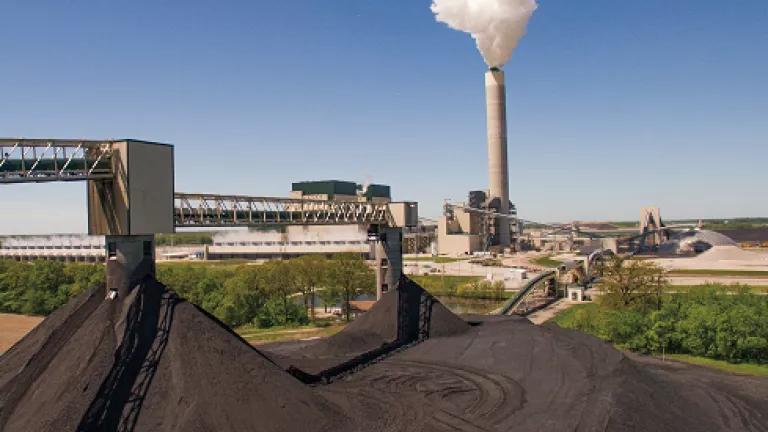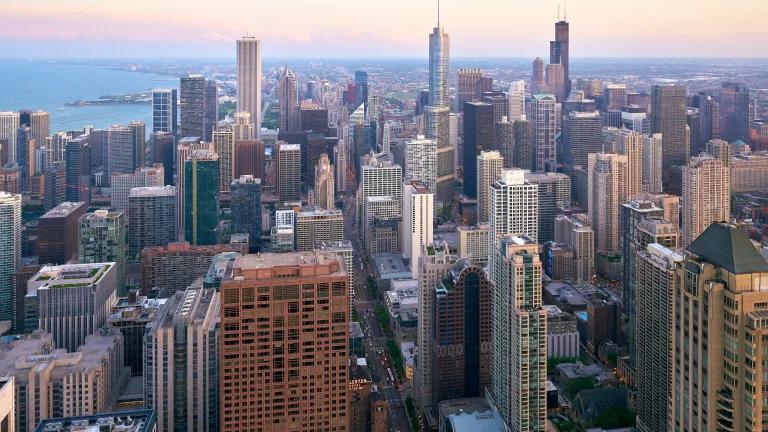Consumers Win If Illinois’ Prairie State Coal Plant Closes
Prairie State is one of the top 10 polluters in the nation.

Consumers would likely benefit if Illinois’ Prairie State Energy Campus (“PSEC”) coal plant closed, according to a new report by independent energy think tank RMI.
The report’s findings align with studies by the Institute for Energy Economics and Financial Analysis which found that customers of Prairie State coal plant “pay far above market price for electricity” and that the plant has been “a financial disaster” for other communities that buy its power.
Coal is collapsing, clean energy keeps getting cheaper
The poor economics of the Prairie State plant reflect national trends: the sharp decline in coal generation and the rapidly falling prices of clean energy.
Generation from coal power plants has fallen by nearly half nationwide since its peak in 2010. In 2009, 23 coal plants operated in Illinois—today only 11 remain, with five of those slated for closure in the next few years. Coal-fired electricity generation in Illinois fell by more than two-thirds between 2010 and 2020.
Meanwhile, the cost of wind and solar energy have fallen 70% and 88%, respectively, in the last decade. Analysts project that those trends will continue and that by 2030, the cost of solar will fall up to 25% and the cost of wind will fall up to 30% below today’s already-low levels.
So it is not surprising that according to the report, “by 2030, closing PSEC and replacing it with a clean energy portfolio … is expected to save ratepayers money without sacrificing reliability.”
Prairie State is one of the worst polluters in the nation
Prairie State is the largest single source of planet-warming carbon pollution in Illinois (and in the top ten polluters in the country when it comes to CO2). Its closure would provide significant benefits to public health and the climate.
According to the report, Prairie State’s emissions each year are equal to “2.7 million typical passenger cars—more than twice as much CO2 as any other point source in Illinois.”
It’s also the state’s top emitter of many pollutants that harm human health: it “emits more methane, SO2, and NOX than any other power plant in the state,” according to RMI’s report. Those toxins take a toll on Illinoisans: Prairie State causes about one premature death every week.
Prairie State forces Illinois communities to buy dirty, expensive power
Despite the high cost of power from the Prairie State plant, the harm to our health, and the availability of cheap clean energy, communities that buy power from the plant are boxed in by restrictive contracts. These “take-or-pay” contracts put municipal utilities (including those in Naperville and Batavia) and rural electric cooperatives “on the hook to pay for the plant no matter how expensive it is.”
Some Illinois cities and towns have had to raise electric rates and raise taxes to pay for this overpriced, dirty energy. Others have even petitioned the state Attorney General for help escaping the contract. So far, these communities have remained trapped.
The ownership of the plant is incredibly diffuse - nearly 400 utilities across 14 states have a stake in it—meaning that Illinois communities can't close the plant without permission from dozens of out-of-state entities with their own agendas. At best, it's a wicked collective action problem; at worst, there's next to nothing these communities can do on their own.
The Clean Energy Jobs Act offers a just transition away from coal
While individual communities may not have the means to close Prairie State, the State of Illinois does, through its authority to regulate emissions from power plants.
The Clean Energy Jobs Act (“CEJA”) proposes to do just that, moving Illinois completely away from fossil fuel power generation by 2030 - Prairie State included.
RMI’s report finds that an approach like CEJA’s may be the best solution: “Keeping PSEC closure in comprehensive clean energy legislation can help overcome a collective action challenge that may keep PSEC owners from all agreeing to close the plant, and it can also help PSEC owners avoid the increasing liability over long-term coal ash disposal from PSEC.”
While our health and our future depend on moving away from fossil fuel power plants, the communities and workers affected by that transition deserve our support.
That’s why under CEJA, workers who lose their jobs due to reduced operations or closures in power plants or coal mines would be protected by the Displaced Energy Workers Bill of Rights, and would receive:
- Mandatory advanced notice of planned closures
- Continued health care for two years
- Protection for workers’ retirement and pensions (fossil fuel companies have attempted to use bankruptcy to rid themselves of workers' pension obligations)
- Full-tuition scholarships to any Illinois state university, community college, or trade program
- Financial advising
- Career counseling, and tax incentives for businesses who hire them
CEJA also supports communities impacted by the closure of fossil fuel plants, designating them as Clean Energy Empowerment Zones, and providing them with:
- Tax base replacement for up to five years to cover lost tax revenues due to the closure of a fossil fuel power plant or coal mine
- Investment incentives for clean energy companies to locate in Clean Energy Empowerment Zones
- Support from the Illinois Department of Commerce & Economic Opportunity to help find new opportunities for their communities
The Prairie State coal plant was built when the writing was already on the wall about the danger of climate change and the looming end of coal. But communities were lured with false promises into long-term contracts that have proven financially disastrous.
If Illinois doesn’t act, a child born when their town signed a contract with Prairie State in 2007 could go grow up, finish school, attend and graduate from college, get married, and still be paying for Prairie State on their electric bills even as they have children of their own.
It’s time for Illinois to support a just transition away from the disastrous, dirty, Prairie State coal plant. Our wallets, our lungs, and our climate will be better off.


